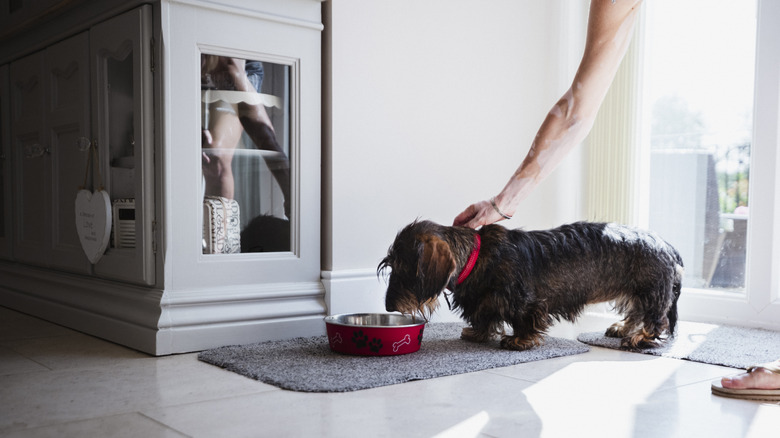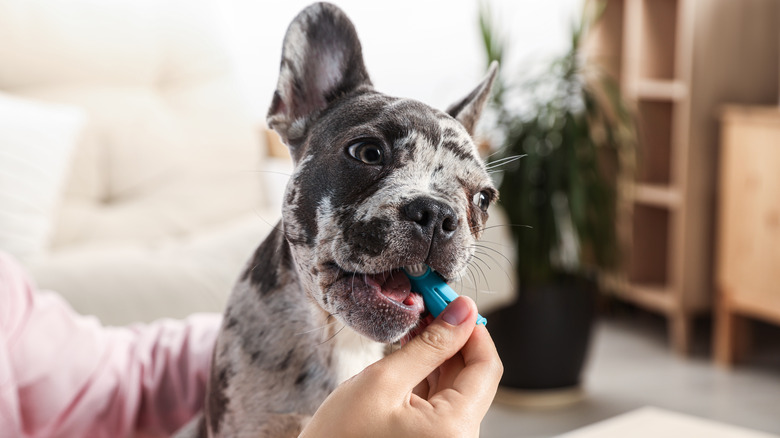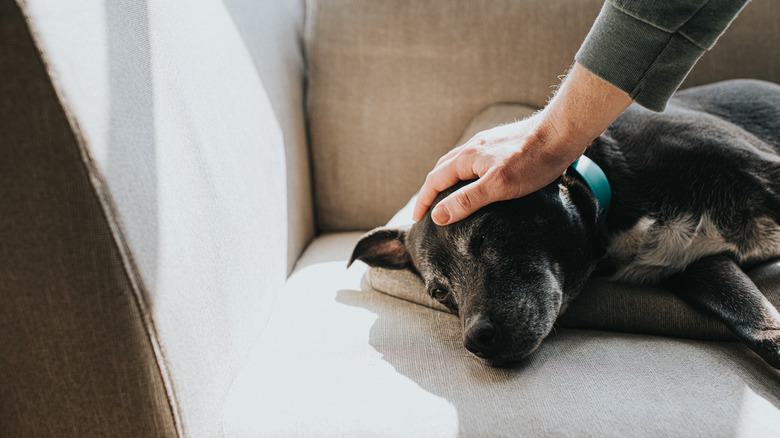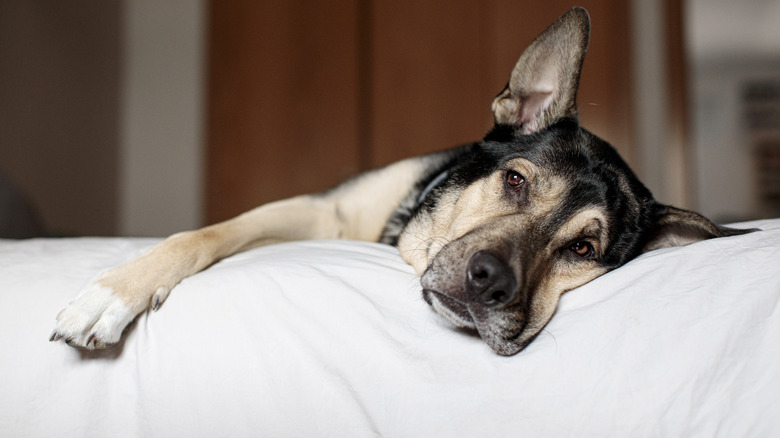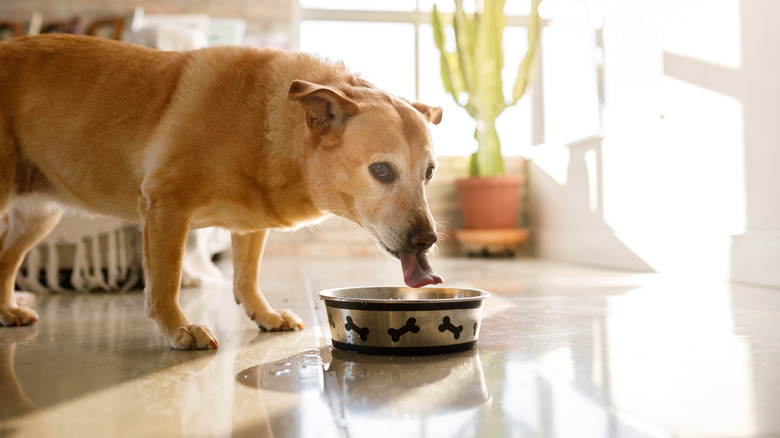What It Really Means When Your Dog Refuses To Drink Water
If your beloved dog just won't drink water no matter what you try, chances are there is something bothering them. A dog might refuse to drink water for a lot of different reasons, and it might be fine for short periods, but going too long without water can lead to dehydration. If your dog stops drinking water out of the blue, you should take them to a vet to make sure there isn't an underlying issue that is causing them to not drink any water.
Sometimes dogs refuse to drink water because of pain or discomfort caused by an emerging dental issue or health condition. Other times, your dog might simply be picky or not as thirsty due to changes in the weather. Whatever it may be, it's important to get to the root cause — after all, your dog has to drink water to prevent dehydration and to stay healthy overall.
Dental problems
One reason your dog may be avoiding water could be due to dental problems. If your pup is dealing with tooth or mouth pain, drinking water could be less appealing to them due to this pain, as well as cold water being sensitive on their teeth. Dental disease is very common in dogs, and could be a possible oral-related reason your pup is refusing water. Veterinary dentist Tony M. Woodward told Daily Paws that "veterinary patients don't receive care that approaches the levels most humans receive. Many dogs don't receive any home care at all. As such, periodontal disease is eventually seen in most dogs."
A mouth injury is another reason your pup might not want to hydrate. If you suspect something may be wrong with your dog's mouth, inspect it for splinters or other small objects that could have gotten lodged in between their teeth, cheeks, or tongue. A broken or chipped tooth can also cause your dog mouth pain and therefore lead to them not wanting to drink water. If your dog is showing symptoms of a toothache or other dental pain, it's important to treat these issues to prevent dehydration and other problems from arising.
Upset stomach
Stomach problems are another reason your dog could be avoiding water. There are multiple stomach issues a pup who isn't interested in water could be facing, such as nausea. If your dog is nauseous, chances are they won't have an urge to drink like they normally would. Various factors could cause your dog to be nauseous, such as a change in diet or ingesting a toxin or spoiled food.
Even if your dog isn't vomiting or nauseous, an upset stomach can also cause them to not want to drink water. In some cases, your dog may have an underlying gastrointestinal condition such as inflammatory bowel disease that is causing stomach issues. If your dog is dealing with gastrointestinal issues and refusing to drink water, they aren't replenishing the fluids they are losing from having diarrhea or vomiting, so you will want to seek veterinary help to prevent severe dehydration.
Old age
Your dog could be less interested in drinking water simply because they're getting older. When dogs age, they may not have the typical cues that tell them when to drink, or feel thirsty as often in general. If your older pup is currently on a dry food only diet, consider switching them over to wet food as it's easier for them to eat and can provide some extra hydration to compensate for not getting as much from their water bowl.
Another reason your senior dog might be refusing to drink water is because they've developed arthritis. Your dog might be experiencing a lot of joint pain that makes them not want to get up and get a drink, or pain so acute they physically aren't able to walk to their water dish. If your dog is limping, stiff, or having trouble standing up when lying down or sitting, arthritis could be the reason they are refusing water.
Underlying illness
An underlying illness could be stopping your dog from drinking water. Urinary tract infections are one common condition that can affect your pup's water intake. Veterinarian Jamie Whittenburg explained to the AKC that "a urinary tract infection in a dog occurs when there is growth of bacteria in the bladder." While some dogs might drink more water with a bladder infection, oftentimes they will drink less if the infection is causing a lot of pain. If your dog is showing symptoms or signs of a bladder infection, such as peeing around the house, they could be in pain and not wanting to drink.
Other illnesses and diseases could also have your dog feeling unwell and affect their water intake. Kidney disease, diabetes, and cancer are all conditions that can affect your pup's water intake. If you suspect your dog is avoiding water because they're sick, take them to the vet to be checked out as soon as possible.
Non-physical reasons
If a health problem isn't causing your dog's resistance to water, they might not be wanting to drink for other reasons. For instance, their water dish could be dirty. Dirty water has a different smell to dogs due to bacterial growth, and that can be unappetizing to them. If your dog isn't drinking, try cleaning out their water dish and refilling it with clean, fresh water. Be sure to wash your dog's bowl daily to prevent bacteria so your pooch feels more inclined to drink water.
Anxiety can also cause your dog to not feel as inclined to hydrate. If your pup struggles with separation anxiety, or is dealing with a new stressors like moving to a new home, it can make them nauseous, and therefore less inclined to drink. While not drinking water is typically caused by pain, discomfort, or an underlying condition, you could also just have a picky, otherwise healthy pup on your hands. If this is the case, try moving their water bowl, refilling it with different water, or use a different dish, such as a dog water fountain, to try and find something they tolerate.
